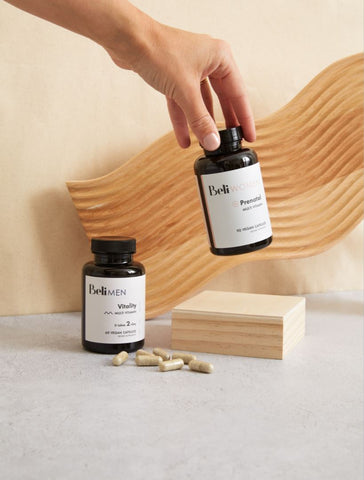It takes two, baby! You can’t lift the sectional alone, and you won’t make a baby by yourself, either. Parenthood is a partnership that begins long before baby is born, during the three to six months leading up to conception—if not well before. If you’re trying to conceive, that means you both need a prenatal vitamin. Here’s why.

The Preconception Window
The preconception window is a golden opportunity for both men and women to fuel their fertility for three key reasons—increasing odds of conception, staying pregnant, and passing on a legacy of vibrant health to your baby. During this time, both sperm and eggs need the protection of a well-nourished parent environment as they mature in preparation of a healthy conception. Here’s the thing — the right fertility supplements can make a measurable difference.
At this time, published, large-scale studies looking at the direct link between prenatal vitamins and pregnancy rates simply aren’t available. But there are plenty of studies linking micronutrients—think folate, vitamins C, B6, B12, D, E, and K2, zinc, chromium and choline—to the processes that are necessary for conception.
For couples ready to become parents, quality prenatal vitamins—one for her and one for him—can be the key to ensuring the kind of optimal fertility health that can be hard to get from diet alone. The truth is, the fertility of each parent can impact your ability to get pregnant, stay pregnant, and deliver a healthy baby.
And that’s where Beli comes in.
We dove deep into the science of fertility nutrition to create our Beli for Men and Beli for Women complete preconception and prenatal multivitamins.
The thoughtfully-formulated nutrients in Beli prenatals have been shown to promote many factors of fertility health, such as improving sperm count, protecting egg quality, reducing the length time it takes to get pregnant, and increasing the likelihood of carrying a healthy baby to term.
Beli for Women
Before conception, Beli for Women Prenatal nourishes fertility health with the science-backed nutrients that have been shown in clinical trials to protect and promote egg health: vitamins B6, B12, E, and K12. Once pregnant, our prenatal supports healthy fetal development with methylfolate, a natural and superior form of folic acid that is easily absorbed by mama’s body. Beli for Women also contains the recommended level of choline, an important nutrient involved in neural tube development—and one that is all-too-often missing from other prenatal vitamins. Our high-quality iron and TRAACSTM minerals are gentle on the stomach and help to provide lasting energy for birth and postpartum recovery.
Beli for Men
Getting pregnant is largely a numbers game, so we formulated Beli for Men with the nutrients that studies show can help promote sperm development and quality, protect sperm while they mature, improve sperm morphology and motility, and support overall health.
Beli’s proprietary Vitality BlendTM of antioxidants can help curb oxidative stress which damages the DNA sperm carry, plus a powerhouse adaptogen called Shilajit, long prized in Ayurvedic medicine for its ability to help improve sperm quality.
And bonus — the simple act of supplementing with Beli for Men is a tangible way to show your partner that you’re serious about supporting her and for your future child.
Even after conception, our carefully calibrated blend of high-quality nutrients supports hormonal balance for lasting energy during the transition to fatherhood.
Two Is Better Than One
The science is clear—preconception health for both parents matters. Proper nutrition, including Beli’s high-quality targeted prenatals for him and her, can help support your nutrient needs on your path to parenthood, and getting started is as easy as clicking this link.
Any statement made on Belibaby.com has not been evaluated by the Food and Drug Administration. This product is not intended to diagnose, treat, cure, or prevent any disease. We recommend consulting with your medical provider before starting any new supplement.
This article is for informational purposes only, even if and regardless of whether it features the advice of physicians and medical practitioners. This article is not, nor is it intended to be, a substitute for professional medical advice, diagnosis, or treatment and should never be relied upon for specific medical advice. The views expressed in this article are the views of the expert and do not necessarily represent the views of Beli.


